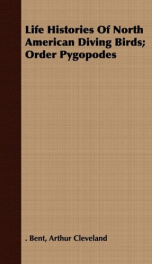life histories of north american diving birds order pygopodes

Life Histories Of North American Diving Birds; Order Pygopodes. INTRODUCTION The monumental work undertaken and so ably begun by Maj. Charles E. Bendire has remained unfinished, and no additional volumes have been published since his death. In 1910 the author undertook to continue the work and began to gather material for it with the co-operation of American ornithoIogists. The following well known ornithologists offered to help in gathering material from their several sections of the country Harold H. Bailey, WaIter B. Barrows, Allan Brooks, Earle A. Brooks, William L. Finley, Ben- jamin T. Gault, A. Brazier Howell, Lynds Jones, Elrner T. Judd, Charles R. Keyes, Arthur H. Norton, Putnam B. Peabody, T. Gilbert Pearson, Charles J. Pennock, Walter W. Perrett, Samuel F. Rathbun, Thornas S. Roberts, Aretas A. Saunders, William E. Saunders, Witmer Stone, Myron H. Swenk, Charles W. Townsend, Edward R. Varren, and Arthur T. ilrayne. The BiologicaI Survey of the Department of Agriculture, at Washington, very kindIy placed at my disposal its matchless bibliographical index to published material on North American birds, and a mass of references were carefully copied by Mr. Edward A. Preble. With this and the authors private index as guides nearly every publication of importance relating to North American birds has been consulted. While the scope of the work was originally intended to cover substantially the same ground covered by Maj. Bendires work and in practically the same manner, it has since seemed best to some what enlarge its scope and to cover more ground, with the different phases of the life histories arranged in a more definite and uniform sequence, so that the reader may more readily find the parts in which he is interested. The classification and nomenclature adopted by the American Ornithologists Union in its Check List have been strictly folIowed, regardess of the authors views on the status of certain species and subspecies as this is not a work on systematic ornithology, it has seemed best to merely refer to these views briefly in the text and not attempt to discuss them fulIy. The main breeding and winter ranges are as accurateIy outIined as limited space will permit the normal migrations are given in sufficient detaiI to indicate the usual movements of each species it is obviously impossible to give, in a general work of such large scope, all records of occurrence and all dates and no pretense at perfection in this direction is claimed. Many published records, are impossible to either verify or disprove, have been accepted if they are apparently within the known limits of ranges. The nesting dates are the condensed results of a mass of records accumulated from the data in over 60 of the largest egg collections in the country, as well as from contributed field notes and from many published sources. They indicate the dates on which eggs have been actually found in one or more portions of the breeding range of the species, showing the earliest and latest dates and the limits between which at least half of the dates fall. The names of colors, when in quotation marks, are taken from Ridgways Color Standards and Nomenclature 1912 edition and the terms used to designate the shapes of eggs, when in quotation marks, are taken from Ridgways Nomenclature of Colors 1886 edition. The italic figures in the measurements of eggs indicate the four extremes of measurement...
Info about the book
Author:
Series:
Unknown
ISBN:
1609490363
Rating:
5/5 (4)Your rating:
0/5
Languge:
English
Users who have this book
Users who want this book
What readers are saying
What do you think? Write your own comment on this book!
write a commentif you like life histories of north american diving birds order pygopodes try:
Other books by this author
Do you want to read a book that interests you? It’s EASY!
Create an account and send a request for reading to other users on the Webpage of the book!


